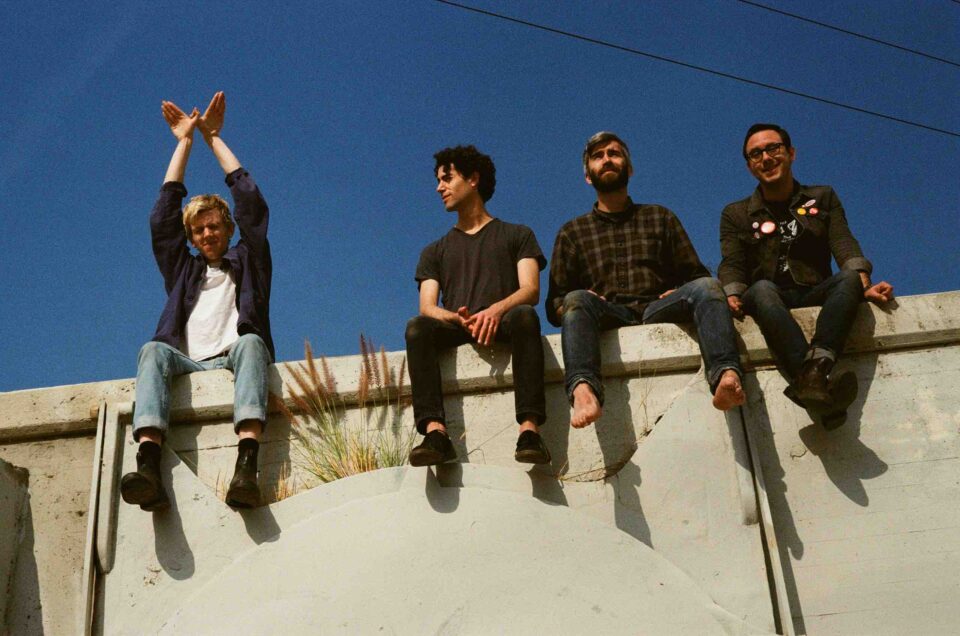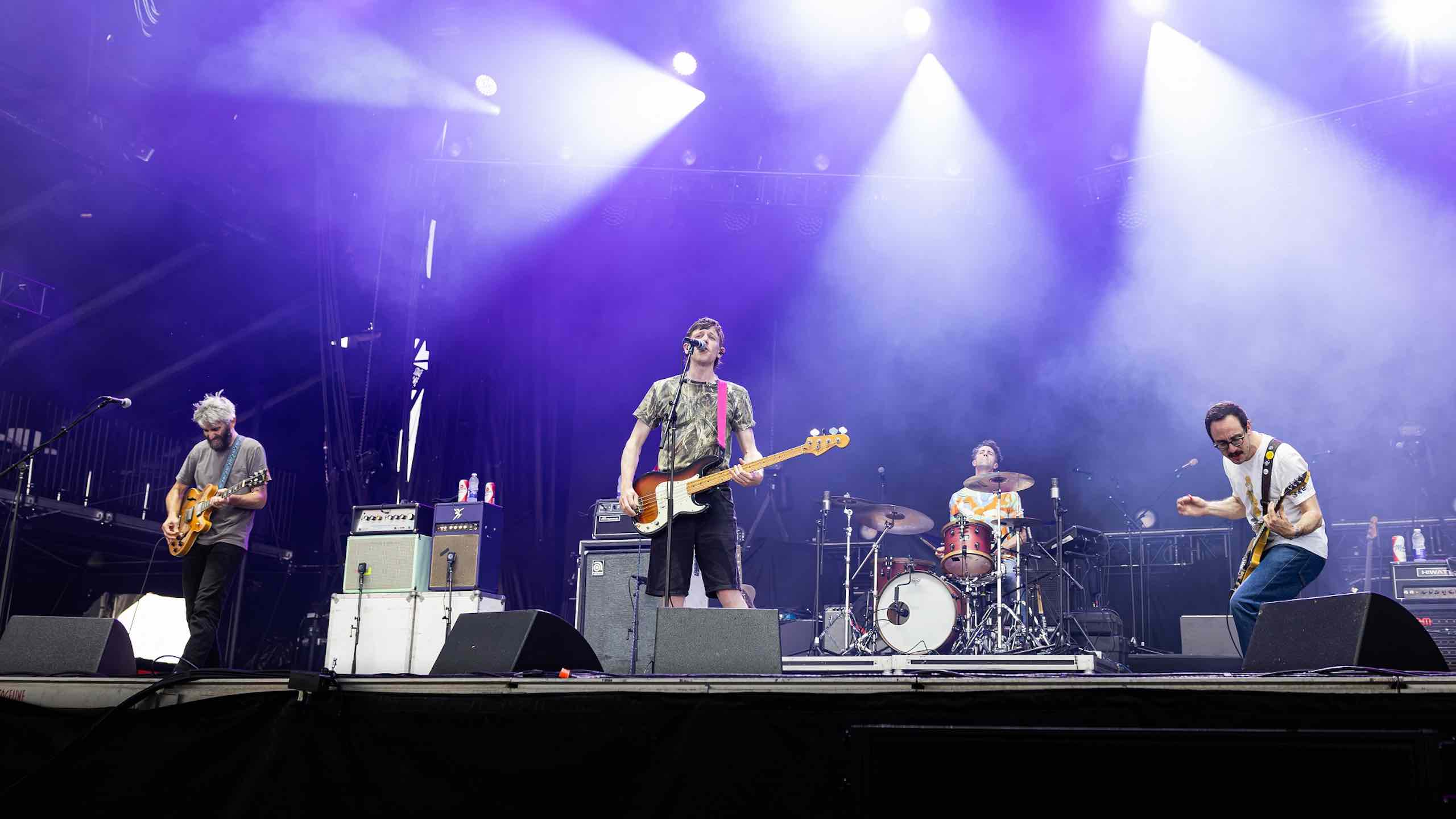If 18 years doesn’t sound like a long time to you, consider this: When Tokyo Police Club first emerged in 2006, I received their debut EP A Lesson in Crime from a friend on a flash drive that I plugged into my desktop PC so I could import the album into my iTunes library where it sat alongside music I’d purchased for various sums of digital currency. Now, countless financially successful schemes for cheapening the value of a musician’s output later, the indie rockers’ last show will arrive just before the band would’ve celebrated two whole decades surviving and somehow even thriving within indie rock. It’s a minor miracle, but then again, if a band as good as Tokyo Police Club can’t go out on top, what hope do we have left?
It’s been exciting watching this band grow, with an understated sense of myth developing alongside them. There are the infectious live shows that verge on total chaos (at least they did back in ’07, the last time I saw them), contrasting somewhat with their utter approachability both before and after their sets at the merch booth. Their songs evolved from two-minute bursts celebrating being young and dumb to thoughtful and complex meditations on love and death and the mundanity that fills up the moments in between. Rarely does maturity come across so clearly. And yet, there’s no shame in the band’s early work—far from it.
All of that is to be celebrated by fans and the band alike as they embark on one final run, which crosses the border into the States this weekend and wraps up in Toronto on November 29 with a final night of four sold-out hometown gigs. To celebrate a truly historic run, and to make up for stealing A Lesson in Crime all those years ago, we caught up with the band’s keyboardist/guitarist Graham Wright to discuss this last go-around.
Is there anything that feels different about this tour now that it’s the last one?
The biggest indicator that something’s different is the way that people are talking and responding to us. I haven’t gotten the full force of the nostalgia yet, but it’s just felt like everyone’s really present and attuned and paying attention both on stage and in the crowd. That’s not always the case in this line of work. It’s been cool to feel like everything’s just normal.
Will the band be running the merch booth like in the old days?
Josh [Hook] and I would usually go out to the merch stand before and after the show. Because of that, we were just meeting everybody who stuck around, and I really liked that. We’re not doing that on this run, because the venues are bigger. We’ll definitely make a point of going out and talking to people. It’s going to be intense, and I think we’re going to individually and collectively figure out how much energy we have for it as we go along.
People aren’t shy about hitting you with whatever it is they’re feeling, which is cool and has always been one of the most surprising and moving parts of doing this. You can really tell when you’re talking to someone who has something that they really needed to talk about. It’s meaningful for them. It’s really interesting just on a human level to have many vulnerable, intense sessions, one after the other. It does cost you some energy, because you never want to start being phony. The easiest thing to do would be to nod and tell people what they want to hear. You have to work sometimes to not do that, because it becomes mechanical. There’s a hundred people in line and I got to move them through.
“Because it’s the farewell tour, we have this license all of a sudden to just delve into the back catalog. There’s nothing new to promote. It’s simplified in that way.”
Has there been a certain album, era, or song that’s surprised you with how the audience reacted to it?
It’s been cool—especially in the summer, because you tend to be playing to a more casual audience at a festival. If there are 8,000 people there, they’re not necessarily all diehards. Because of that, and also because it’s the farewell tour, we have this license all of a sudden to just delve into the back catalog. There’s nothing new to promote. It’s simplified in that way. The conflict between playing the hits and playing the new stuff is as old as rock and roll itself. We’ve been playing a lot more of the old stuff, and it’s been really cool remembering how much people respond to that. We’re 20 years removed from writing and recording those songs. We’re able to look at them with a bit of aged wisdom.
Do you allow yourself to indulge in the sadness of TPC being done?
Yeah, absolutely. This is maybe easier said than done, but my goal for this whole year, because it’s so emotionally heavy, is just to take it as it comes. People keep trying to book stuff with me for the day after the last show, and they’re like, “We should set up brunch on Saturday, what if we get everyone together for dinner?” I’m like, “How could I possibly commit?” Maybe I want to go to brunch, but maybe I’m going to be in the shower with my clothes on for the ninth consecutive hour weeping? I want to make sure that I have space to do whatever I need to do.

Have you imagined what those last Toronto shows are going to be like?
It’s really hard for me to imagine a gig that’s somehow different from a regular gig, just because I have such a complete understanding of what a gig is. For instance, our last show of the summer was in Saint John, New Brunswick. In my corner of the stage, it was a disaster. Nothing was working. Everything sounded wrong. The entire show I was behind the eight ball trying to fix stuff and play right, and just having a really rough time up there—which happens. Instead of celebrating the end of the summer, I was troubleshooting, playing keyboards, and thinking three songs ahead. I really hope that the last Toronto show doesn’t happen in that way, but if it does, that’s kind of the most truthful thing there is.
Was the plan always for the group to end with a farewell tour?
You never just want to post a thing on Instagram and then disappear, especially when there’s no nefarious reasons for it. This is the kind of shit that people always say fakely, but we genuinely had no idea what the response was going to be. We were like, “We’ll put out the two last new songs and we’ll announce a show here in Toronto at this venue, the Opera House—if people really like it, we’ll do another show, maybe we’ll do three shows at the Opera House, that’ll be cool.” And then our agent was like, “I think we should probably aim for a bigger venue, guys, I think people are going to be pretty into this.” Sure enough, the Toronto shows have ballooned to four nights at this huge venue, by far the biggest thing we’ve ever done in any one city by a wide, wide margin.
And then gig offers started coming in from everywhere, and we had to take a minute. You’ve already started to make peace with this coming to a conclusion, so are we going to get back on the bus for two more big tours? That’s a fairly big bite, but that dissolves so quickly. We spend all these years trying to keep audiences invested and hitting the road and making records and doing interviews and all the songs and dances you do to be a band. It was pretty obvious, like, “Oh wait, everyone is finally banging down our door and begging us to come, we should probably say yes.” It would be pretty shirtless of us to just say, “No, thank you.” I want to have every experience one last time. A big, long tour whereby the third week you’ve just completely lost your mind is a really important part of what we’ve done, and I want to have that feeling again.
“A big, long tour whereby the third week you’ve just completely lost your mind is a really important part of what we’ve done, and I want to have that feeling again.”
Was the end of the band just creative differences?
Yeah, basically. It’s not the first time that the notion of wrapping things up has been mentioned. Our 2018 record, TPC, which I guess is now our last album—we thought about stopping the band before we made that, and then we were like, “Eh, let’s try and make a record.” Through that process, we were all really excited. This time, when it came up, nobody was like, “Wait, let’s get back in the saddle.”
The longer you’re in a band—if you’re not lucky enough to be in Wilco or something—the harder it gets to just keep things even keel. It’s just the nature of the business and the nature of novelty and supply and demand, all this boring shit that you don’t even want to think about when you’re playing guitar. You shouldn’t have to think about it, except that we’re compelled to live in a capitalist system where we have to apply our trade in exchange for money. So at a certain point, just when the idea came up, everyone found themselves saying, “Maybe this is right.” Nowhere is it written that a band has to live forever. I had long assumed that just because I wanted to be in a band so bad, and I got to be in a band, I should never relinquish it. The tail can start to wag the dog at a certain point.
For my own part, I just suddenly found myself really excited to reevaluate my relationship with music and with Tokyo Police Club. It’s obviously bittersweet—and kind of scary—not knowing necessarily what’s coming next, but none of those things are good enough reasons to drag the band along. I’m so proud that we have this body of work that is, in my personal humble opinion, flawless and unimpeachable. There’s no crappy ninth record. We don’t have to do a record where it’s a return to form and everyone pretends that it sounds like A Lesson in Crime, even though we’re, like, 45. FL







